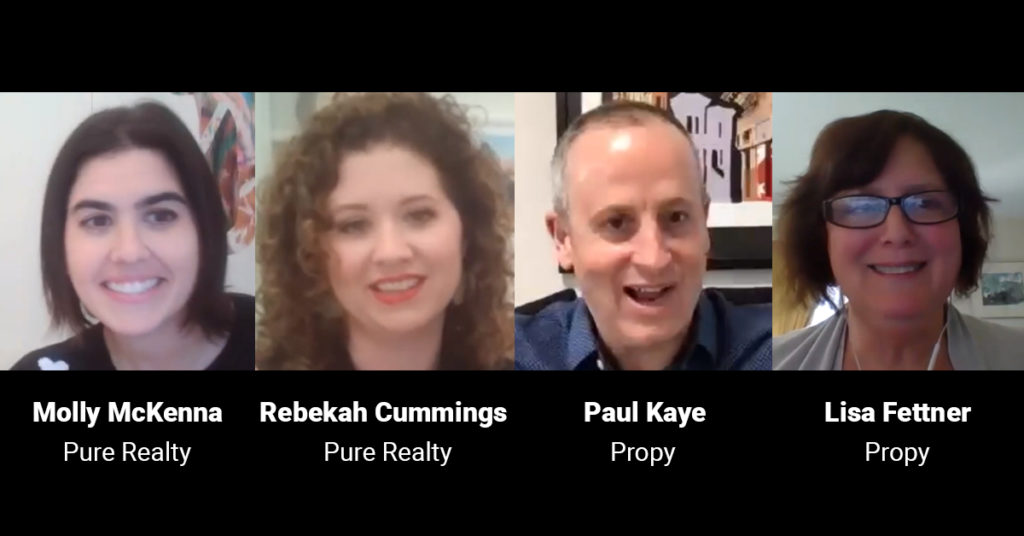Molly McKenna, Director of Operations at Pure Realty and Rebekah Cummings, Licensed Realtor at Pure Realty join Propy’s COO, Paul Kaye, and Propy’s Real Estate Marketing Consultant, Lisa Fettner in this week’s webinar.

Molly McKenna, Director of Operations at Pure RealtyandRebekah Cummings, Licensed Realtor at Pure Realty join Propy’s COO, Paul Kaye, and Propy’s Real Estate Marketing Consultant, Lisa Fettner to discuss the important role that an agent plays in a multiple offer situation. Additionally, Molly and Rebekah share some tips on writing offers, and why using a local agent is key to help your buyers come out on top.
Background
Rebekah Cummings is an agent with Pure Realty, and founded the Cummings Team with her husband, Paul. It was her husband’s idea to get into real estate, and Rebekah wasn’t sure about making this career change, but once she held her first open house, she knew this was her calling. With her degree in marketing, she is able to use that background to help her clients with their home buying decisions. The relationships Rebekah builds with her clients is what drives her passion for this industry.
Molly McKenna moved to the Austin area seven years ago from Boston, and is Director of Operations at Pure Realty in Cedar Park, Texas, which is right outside of Austin. When she started working at the brokerage, they had 30 agents, and now have grown to 153 agents at the brokerage.
The challenge of buying in a competitive market
Paul explains that he and his wife have been casually looking for a new home for about two years, but with the onset of COVID, they started to get more serious about making a move. Two months ago, they focused their search in a bedroom community they fell in love with across the Bay Bridge from San Francisco.
He explains that when he bought his current home 14 years ago at the start of the housing crisis, he found a home he liked, made an offer, and was under contract quickly. Today, he is experiencing a much more difficult process with buying, and has made many offers that have not been accepted. He is hoping that Rebekah and Molly can shed some light on what can he do as a buyer, and what can his agent do, to improve his odds with his offers.
Rebekah states that she is primarily a listing agent in the Austin market, and it’s not uncommon to get 30-45 offers on a property, but out of those, there may be only be 10-15 good offers.
The importance of agent relationships
Rebekah explains that one of the best things a buyer’s agent can do is contact the listing agent and tell them about the buyers when they are submitting an offer. As a listing agent, she said when she gets a lot of contracts and has to go over all those facts and figures with the sellers, and then tell them they have to decide on which one to choose, it can be really hard for the seller to make a decision. When she has a buyer’s agent that takes the time to have a conversation with her about the buyers, and has their lender call her to go over their pre-qualification, it makes a big difference for her and that offer really stands out.
Presenting offers to the sellers
Rebekah says that some of her sellers physically want see each offer and go through all the paperwork, but most sellers prefer that she provides a summary of each offer so they can more easily compare them. To do that, she uses an excel spreadsheet and puts all the critical information into a paragraph for each offer.
The importance of waiving contingencies
Lisa shares that her parents recently sold their home and received 16 offers, and half of them were really solid offers. About 20% of those offers were waiving contingencies and had short closing time frames. Lisa is curious what buyers can do to help them rise above other offers when you have several good ones in play.
Rebeka states that waiving contingencies is extremely important to sellers. Sellers want to know how quickly will they get to closing, and that they actually will get there. It all comes down to the associated risk of that offer. She continues by saying that she has recently seen an increase in properties that go under contract, and then 30 days later are back on the market because the contract fell apart, which is a challenging situation for the sellers.
As a buyer, whatever you can do to eliminate risk to your sellers will make your offer stand out. One of the best ways to eliminate risk is to waive contingencies. However, Rebekah stresses that having a contingency doesn’t mean that your offer won’t be accepted. As a buyer’s agent, it’s critical to contact the listing agent and explain why you need the contingency.
For example, Rebekah explains that typically when someone is selling their home, they will be buying another home, so it’s normal to have an offer contingent on the sale of their home. By calling the listing agent and explaining where your buyers are in that process, and that their home will sell quickly, will help to create a win-win for each side. Agent communication is critical whenever there are contingencies.
Cash offers
“It may be a cliché,” Rebeka says, “but cash is king.” She explains that with an all-cash offer, the buyer has reduced the risk because there is no lender involved, and they typically can close very quickly. She shares that she recently sold her house, and out of the 14 offers received, she chose the cash offer even though it wasn’t the highest offer. The reason? Because they were able to close in 12 days vs. 30 days and get her to where she wanted to be faster.
Paul is curious why sellers would be willing to lose potentially up to $10-$20k by taking a cash offer. He states that is a lot of money to get simply by waiting maybe 15 days longer.
Rebekah explains it’s important to keep the seller’s countering ability in mind. If the sellers receive one offer in cash but the sales price is lower than the financed offer they received, they can always go back to the cash deal and counter so the price is matched.
Lisa states that so much of getting an offer accepted, whether all-cash or financed, is communication with the agent and making your client human to the sellers as opposed to just a stack of papers in the offer. The more an agent can do to present the real-life person will help set your offer apart. She said that if your buyers have been making a lot of offers and haven’t been able to go under contract, that kind of information will resonate with a seller. Buyer’s agents need to put a face to that stack of paper when they are making an offer.
Writing a letter to the seller
To Lisa’s point about putting a face to the offer, Paul mentions that he has heard that writing a letter to a seller is a good thing to do, but has doubted it will have much impact.
In the past, Rebekah said she really liked getting the letters and stories from buyers, but encourages them to not include any photos, due to fair housing regulations. However, with the current competitive market she suggests that the buyer’s agent contact the listing agent to find out if the seller is accepting letters. Some sellers do not want to deal with the emotional, personal side of an offer.
Leasebacks
Paul wants to learn more about how much influence a leaseback can have when making an offer.
Molly shares that what is most important to the seller may not always be the amount of cash they get. For some sellers, having a long leaseback will be key if the seller needs time to find a new home. But if the buyer’s agent doesn’t talk to the listing agent, they will never know what’s going to be most important for that seller.
In the past, Rebeka explains, leasebacks were generally only a few days overlap. But today, in this competitive market, it may take some time for the seller to find a new home to purchase. Having a leaseback means that the seller would have all of their net proceeds, and not have to move twice.
Again, this is where agent communication is so critical. Calling the listing agent to let them know they buyers are flexible on closing dates and can do a leaseback, will make that offer stand out if the sellers need this.
Rebekah states that it is also helpful to market the property correctly if the seller does need a leaseback. She was able to get a 9-month leaseback for one of her clients, because she focused her marketing on what that seller needed.
Lisa explains that the real key is to find out what the situation is for the seller’s and what they need. When buyers can craft an offer that is competitive on what the seller’s needs are, they will be more likely to be accepted.
The importance of hiring an agent with local knowledge
Paul shares that when he hired his agent for his new home search, he chose an old friend who does not live in the area he’s looking in. He is curious what effect that is having on his home search.
Rebeka explains that it is ethical for agents to only work in areas they have competence in. Just because she is licensed in Texas and can access any property from Waco to San Antonio, doesn’t mean that she should or will do that. She said she cannot do her clients justice if she doesn’t know how to walk them through a winning offer, and by not knowing an area and what’s really happening there, she would be lowering their odds of getting an offer accepted.
Molly states that in Texas, you can do business wherever your broker is a member of that board. She explains that agents owe it to their clients to really know the area and understand that local market. They need to have experience in a particular area, either because they live there, or have done business in that area long enough to really understand the in’s and out’s of that market.
In Paul’s situation, Molly feels his agent should have referred Paul to a local agent who really knows that area well.







